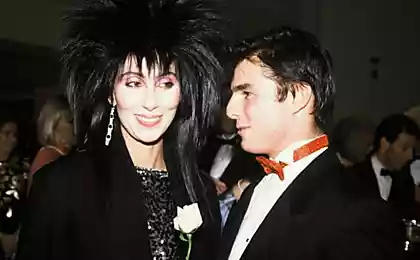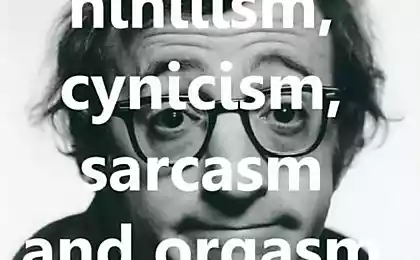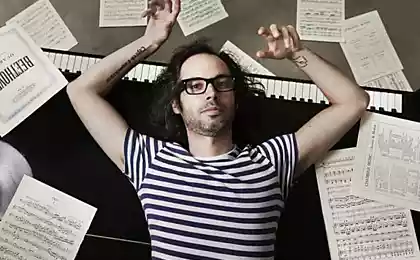436
How to get out of a creative impasse: the 3 secrets of woody Allen
Writer's block is a topic that constantly recurs in the films of woody Allen, but he claims that he never suffers from this problem. He begins to write the script for the next movie the very next day after finishing the previous installation. The secret of its enduring creative performance?

1. Do exactly what you want to dois such that due to external pressure or some miscalculation you feel obliged to do the work that deep down don't want to do? Woody Allen made that mistake only once. The first script that he wrote — it was the screenplay What's New Pussycat? 1965. Allen had the pleasure of working with Director Clive Donner, but the Studio that produced the film, constantly interfered in their work. The result was a complete farce, which Allen felt was disgust.
From that moment on he swore he would never make a movie if you don't control the process itself. He adhered to this decision and does only what gives him enthusiasm, and no matter whether it is to others, whether they understand it. The result is an impressive career spanning 40 years, four Oscars, nine awards British Academy awards and two Golden globes.
If you are doing something because it is like your parents, or your best friend thinks it's cool, ultimately it will lead to apathy. And sooner or later, and to creative burnout.So rule # 1: when there's any choice, do what fills you with enthusiasm.
2. Pour your own unique experienceit is No secret that woody Allen writes in the script their own life experiences. He repeatedly acting out scenes from his romantic relationship from his childhood in Brooklyn. This extremely personal position and self-deprecating dry humor gives the characters in Allen's characteristic brittleness.

In the film "Stardust memories," he tells the story of a Director who no longer wants to make comedies — but they all want to continue. Allen has vehemently denied that the film is autobiographical: "Critics thought that the main character is me... But the point of the film is not in it. It's about a character that has a kind of nervous breakdown, which, despite their success, had reached a point in life that it really bad." No, not at all like woody Allen!
So rule number 2 says that you will never have a shortage of material, if you rely on your own experience. In addition, it will give you the opportunity to foster your own unique creative method — who will be against?
3. When the horizon looming obstacles, integrate them into the workof woody Allen says it's never stalled, but maybe he just cope with this deadlock, describing the stalled characters. In the film "Deconstructing Harry" he plays writer Harry Block. This name is a double play on words: a writer suffering from a creative impasse (block — a "dead end"), but the people around (and he himself sometimes) see him as Satan (one of the nicknames of the devil — "old Harry"). And this is a compelling description of a creative impasse — as if the devil sat on his neck!
So the last rule is: when the horizon emerges a creative crisis, figure out how to use it in their work. You can do it more subtly, you can frankly — you decide.
In any case, it is a good solution: not only do you Dodge the crisis, but you have also appears original and creative move.
In General, to finesse the creative obstacle, use recipes woody Allen:
Source: ideanomics.ru/articles/7887

1. Do exactly what you want to dois such that due to external pressure or some miscalculation you feel obliged to do the work that deep down don't want to do? Woody Allen made that mistake only once. The first script that he wrote — it was the screenplay What's New Pussycat? 1965. Allen had the pleasure of working with Director Clive Donner, but the Studio that produced the film, constantly interfered in their work. The result was a complete farce, which Allen felt was disgust.
From that moment on he swore he would never make a movie if you don't control the process itself. He adhered to this decision and does only what gives him enthusiasm, and no matter whether it is to others, whether they understand it. The result is an impressive career spanning 40 years, four Oscars, nine awards British Academy awards and two Golden globes.
If you are doing something because it is like your parents, or your best friend thinks it's cool, ultimately it will lead to apathy. And sooner or later, and to creative burnout.So rule # 1: when there's any choice, do what fills you with enthusiasm.
2. Pour your own unique experienceit is No secret that woody Allen writes in the script their own life experiences. He repeatedly acting out scenes from his romantic relationship from his childhood in Brooklyn. This extremely personal position and self-deprecating dry humor gives the characters in Allen's characteristic brittleness.

In the film "Stardust memories," he tells the story of a Director who no longer wants to make comedies — but they all want to continue. Allen has vehemently denied that the film is autobiographical: "Critics thought that the main character is me... But the point of the film is not in it. It's about a character that has a kind of nervous breakdown, which, despite their success, had reached a point in life that it really bad." No, not at all like woody Allen!
So rule number 2 says that you will never have a shortage of material, if you rely on your own experience. In addition, it will give you the opportunity to foster your own unique creative method — who will be against?
3. When the horizon looming obstacles, integrate them into the workof woody Allen says it's never stalled, but maybe he just cope with this deadlock, describing the stalled characters. In the film "Deconstructing Harry" he plays writer Harry Block. This name is a double play on words: a writer suffering from a creative impasse (block — a "dead end"), but the people around (and he himself sometimes) see him as Satan (one of the nicknames of the devil — "old Harry"). And this is a compelling description of a creative impasse — as if the devil sat on his neck!
So the last rule is: when the horizon emerges a creative crisis, figure out how to use it in their work. You can do it more subtly, you can frankly — you decide.
In any case, it is a good solution: not only do you Dodge the crisis, but you have also appears original and creative move.
In General, to finesse the creative obstacle, use recipes woody Allen:
- don't do what doesn't meet your instincts or your personal mission;
- focus on the synthesis of your own personal experiences and the main theme, in which you are engaged;
- if you feel that approaching a stupor, reflect it in their work.published
Source: ideanomics.ru/articles/7887























